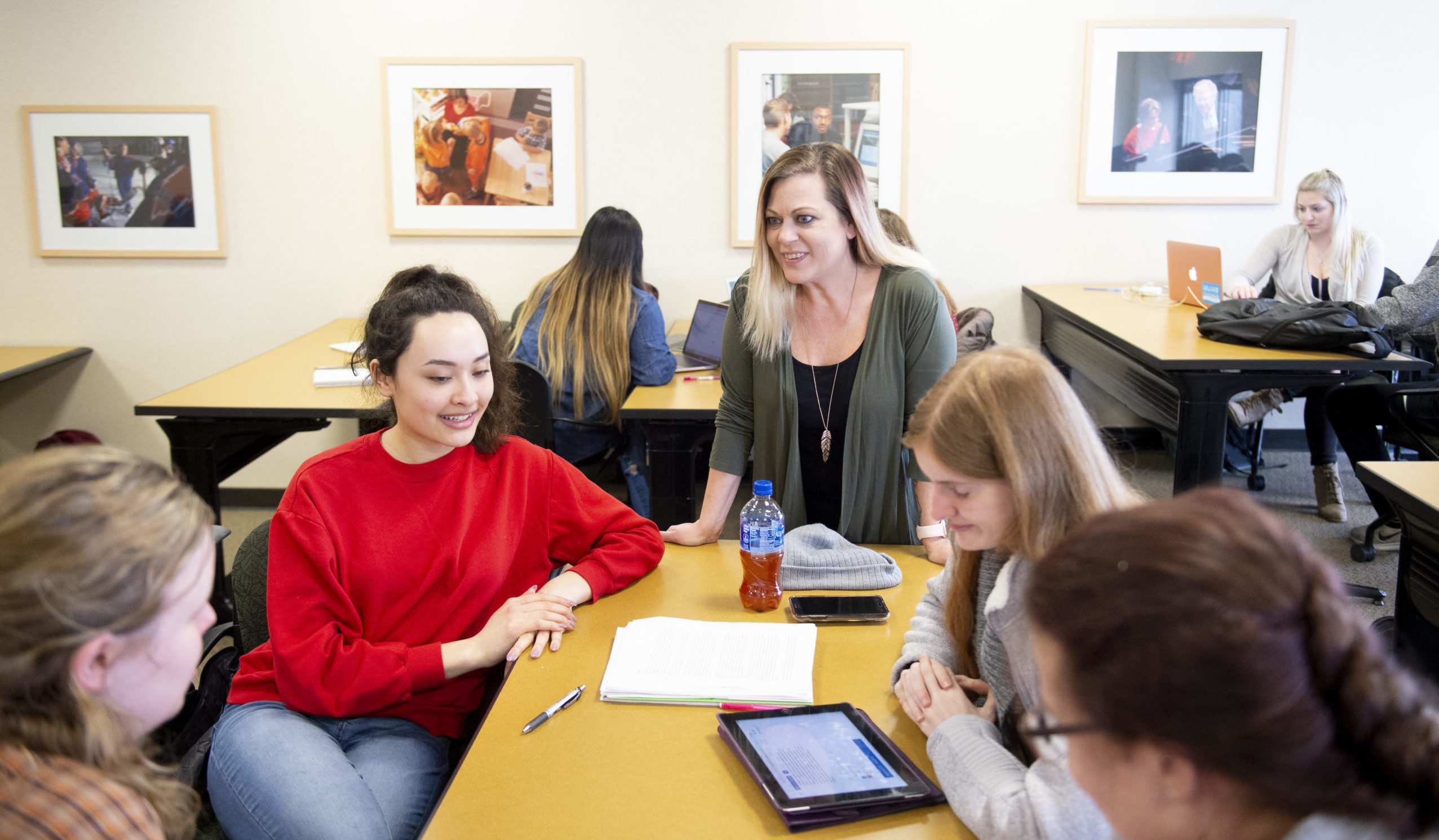
WFG graduate Gina Possin interacts with her students in Marian University’s Industrial Psychology MS program, which she directs. (Photo submitted by Marian University)
Gina Possin likes to say she is on her “second life.”
Today, Possin is an assistant professor of psychology at Marian University in Fond du Lac, where she directs the master’s degree program in industrial psychology. She’s also a proud new grandmother who is completing her doctorate.
But 13 years ago, life looked pretty different. In 2009, Possin was a young single mom who had recently freed herself from an abusive relationship. The Great Recession had made her career in the auto industry untenable, and she desperately needed a change for herself and her daughter.
“I was trying to get out of all things that were bad in my life, really wanting to start things over,” said Possin. “I wanted my daughter to see life the way it should be — every aspect of life. Healthy relationships, healthy work life. I really wanted to be a good mother for her.”
It was a huge “leap of faith” for Possin to enroll at Marian University that year. On the one hand, obtaining her bachelor’s degree could open doors in her career. But, on the other hand, she was concerned that balancing work and full-time school was going to affect her parenting and limit the time she could spend with her daughter.
“I was working ungodly hours at the time,” she said. “It was difficult.”
Then she got news that she was a recipient of Marian University’s Working Families Grant. Funded by an anonymous donor and the Congregation of Sisters of St. Agnes, the grant provides support services and tuition assistance to students who are single parents with primary custody of dependent children.
“It was life changing,” Possin said of receiving the grant, which not only assisted with her tuition but offered financial support for rent, childcare and other bills, allowing her to focus on her studies and prioritize parenting her daughter. “The Working Families Grant is what gave me the tools to be able to do this.”
The purpose of the program is far more extensive than just monetary support. Its mission, explained program director Kerry Strupp, is about strengthening families and helping to build stronger futures through education.
“We really try to break down any type of barrier that would prevent them from being successful,” she said.
Michelle Majewski, president of Marian University, said the Working Family Grant Program is a reflection of the school’s core values, which stem from the charism of their founders, the Congregation of Sisters of St. Agnes.
“Our mission focuses on the education of the whole person, and the Working Family Grant Program was designed specifically to do exactly this,” said Majewski. “I believe it is one of the reasons our program has been so successful, because we do not just focus on academics but rather the whole person.”
In addition to tuition assistance, students in the program benefit from “wraparound support” — stipend grants that help them support their family during their time at the university. They can receive help with rent, childcare, food and monthly bills.
Students also benefit from an extensive support network that includes mentoring, counseling, budgeting, career assessments and employment preparation, academic planning, life skills workshops and more.
“Money is not the only barrier to success,” said Peni Beine, program secretary for the Working Families Grant. Providing emotional and social support and fellowship is a key part of the program — in fact, it is the secret to its success, agreed Majewski.
“Many of the students in this program are first-generation college students who are navigating a system within higher education that is new to them,” she said. “In addition, they are economically disadvantaged, so their challenges can be significant. Supporting the parents and their children results in the children and their parent becoming part of the Marian University community, which enriches everyone at the university.”
“We always say everyone who is a single parent could use someone to talk to,” said Strupp.
Recipients of the grant are enrolled as full-time students at the university’s Fond du Lac campus and are expected to complete 30 credits annually while maintaining a GPA of 2.5 or higher. They also perform 20 hours of community service each semester. More than 200 students who have received the grant over the past 20 years have exhibited a retention rate of 87.2 percent and a graduation rate of 85.4 percent.
Applications are accepted for the program year round. The number of recipients selected depends on the size of the endowment from the anonymous donor, explained Strupp. Typically, there are around 20 to 30 students in the program at one time.
Beine said the university takes great pride in the fact the program is still going strong after 20 years. “The statistics show that the success of this program is warranted, and it’s not offered by anybody else,” she said. “It’s a pretty unique situation that we can offer the supports we do, and a student can get a degree and go on and create a great life for themselves and their family and set a great example for their children.”
In addition to being funded by the anonymous donor and the Congregation of Sisters of St. Agnes, the Working Families Grant program is supported by donations from the public. To support the work of the program, visit https://www.marianuniversity.edu/tuition-financial-aid/working-families-grant-program/.
